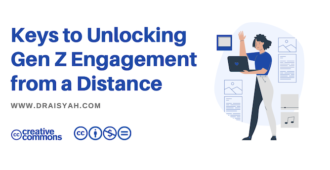The bottomline | Go beyond lectures and lecture notes
After I announced the five micro-learning video modules to the first year pharmacy students, some students came to me and asked: Dr… can I have your lecture notes?
This question is not unusual in the context of Malaysian students. With lecture notes, perhaps many students feel assured that they have ‘the lecturer’s knowledge and contents’ with them. Now they ‘own’ the contents, they just need to memorise the contents for this semester. After exams, balik kampung and forget the whole thing. When the new semester starts, the whole cycle repeats.
This approach in ‘learning’ reminds me of an SPM-mindset… Is it scoring or learning? Are you going for the information or knowledge? And is this what we really want to continue doing in the university?
Highly competitive learning environment coupled with the desire for Sijil Dekan or high academic achievement are often seen as a passport to good scholarships and a better, more secure future for many. It’s not wrong. In fact the competitive spirit should be encouraged and nurtured at every levels, but not at the expense of curiosity and learning to expand one’s horizons. In many ways, life in the university can help preparing students to face the real working life.
Reminiscing my days as a pharmacy student
That question also takes me back to my younger years. I remember my undergraduate years in Cardiff. The Welsh School of Pharmacy at the Redwood Building. There were less than 10 Malaysians studying at the school out of 100 local British students.
Noly and I knew each other from our A-Levels days in PPP/ITM. M19 was our class. She’s now a very experienced community pharmacist, managing a busy pharmacy shop in the heart of JB. There are several Chinese Malaysian classmates of mine. Since we were a small group, we were close but haven’t met them since our graduation. I believe they’re all doing well as pharmacists in different sectors.
We, Malaysians, would always sit together in one row. The 2nd row in the huge lecture theatre was ‘reserved’ for us. Local British would steer clear of that row. They’d go sit at the back. Hahaha…
It’s not about the content
When it comes to lectures, lecturers came in and delivered lectures. Allow me to describe what I meant by ‘delivered lectures’. Say a lecturer walks (or waltzes) in, he goes straight to the computer, pulls up acetates (or transparencies, that’s how old I am!) and starts talking to the class. As he talks, we write. Or rather… scribbles down what he says–as much as we could. Because whatever he says often would be more than what’s written on the acetates. When he pauses, we pause. Stealing a glance away from our notes to his acetates. To him. And waits until he opens his mouth again…
It’s like waiting for gold coins, or pieces of diamonds. We collect and keep them well deep in our hearts and minds. Perhaps one day the gold coins or diamond worth more than that. We knew then, knowledge is precious. Beyond exams.
Back then, a lecture is almost always a monologue. We couldn’t or wouldn’t stop or slow down the lecturer. Or ask him to repeat what he just said? Discussion? What’s your muddiest point? Unheard of.
Time has changed. Now several lecturers have taken initiatives to record video lectures and share them with students. You can stop, pause, fast forward or rewind the videos–as many times as you like. Learn at your own pace. Share your thoughts.
Unspoken rules in lectures
There’s a number of unspoken rules in lectures. It may differ depending on where you are. For example lecturers in the matriculation may not mind interruptions during lectures, but perhaps not in universities. It’s a different ballgame in the uni. And it depends on the lecturers too.
Time is life
One of the few thing I learned is that the British keep time well. If a lecture is supposed to start at 9 am, it will start at 9 am. If you have been to Japan or Germany, if a train is scheduled to depart at 9 am, just watch the second hand. Right on the dot, as the second hand strikes the digit 9, the train starts to move (or arrives). If you are late by 1 second, don’t cry or buat drama… just buy a new ticket for the next train. These are glimpses of the high income, advanced countries. How they value time. Because time is money. Time is life.
In contrast, in Malaysia if we want to meet at 9 am, and announce that it’ll start at 9 am… well, good luck. That meeting will start at 9.30 or 10 am.
To start a meeting at 9 am, we have to tell everyone that the meeting will start at 8.30 or 8.45 am. Then, the meeting will start at the desired time, ±5-10 minutes. So how long do you think Malaysians would be able to compete with those advanced countries?
Coming back to the unspoken rules of lectures. At one time, a British student came a couple of minutes later that the lecturer. The lecturer had started the class. The student walked in and headed straight towards the top seats. The lecturer immediately stopped the lecture, asked who just walked in. The lecturer was red in the face, out of anger. Imagine~lah Mat Saleh bila marah… telinga, muka semua merah. The student replied and then got scolded by the lecturer for being late. In front of everyone.
Coming in late is considered a serious disrespect to the lecturer and other students, particularly when the lecture has started. It’s like abruptly cutting someone, when he/she is speaking. It’s rude. And it’s an unspoken rule.
Similarly, when someone gets up in the middle of a lecture, leaves for some reasons and comes back into the lecture hall. Such behaviour is immature, distruptive and unacceptable in many situations, especially later at work. Of course 1-2 lecturers don’t mind or pretend that it’s okay…
The problem with this ‘pretend’ game is that one day out of the sudden, you may get scolded for a thing you considered small or no issue. The behaviour issue may start with your seniors but the ones who receive the short end of the stick may be you or your batch. Pretending ‘everything is okay’ is a ticking time-bomb. It’s best to learn how to discern whether if something is a real thing or a pretence.
So when I look back that 3 years as a pharmacy student, I realised no one in my batch dared to come in late, or distrupt a lecturer. Ever again.
Lecture or lecture notes?
In my younger days, we would won’t miss lectures; however boring the lecturer or lectures were… I remember we did not even dare to ask Powerpoints from lecturers… Firstly, out of respect towards our lecturers. Secondly, we were too embarrassed to ask because the lecturers would know that we are lazy, and just wanting to be spoon-fed. It leaves a lasting not-so-good impression…
Thirdly, it beats the reasons why one is in the university. A university is where you start to cultivate and nurture your own interests, skills and curiosity in people, cultures, thinking and thoughts by expanding your horizons and most importantly, develop and strengthen your own voice. That includes creating as simple as your own notes.
Learn to be self-reliant, don’t be afraid to make mistakes, reflect and learn from them.You are an adult
Another thing I learn is that lecturers are not obliged to give students lecture notes. Or in today’s language, the Powerpoint used in lectures. Some may just give their Powerpoint freely. Few decline in providing lecture notes. So please don’t expect any. Because when no lecture notes is provided, the unspoken thing is that lecturers are treating you as adults.
In university and later in life, don’t wait to be spoon-fed. Take initiatives. Become the owner of your learning. I can guide you, but you have to learn to walk your own path. Walk, run, crawl, cry, climb, stop, walk again. Through trials and errors.
You may say, Why should I? When everyone else around me is doing relying on lecture notes or senior’s notes? To such questions, my reply is… are you=everyone? What are your values in life? How are you going develop leadership qualities when you just want to be a follower?
Don’t be a follower
Many sleep-walk, feeling lost and don’t know what path they’re walking. Let me tell you one thing about becoming a pharmacist.
When you become a pharmacist, almost automatically you will be placed in a leadership position. For instance, if you want to work in a retail pharmacy, the pharmacist is the manager for all staff. Whether you’ll have 2 or 20 staff under you. The staff will listen to you–whether they like it or not. When they like you and follow your instruction, it’s probably fine. But when the staff misbehave, where will you stand? How will you handle such situation?
So start cultivating leadership qualities from now on in your university years. I’m afraid if you feel reluctant to start now, a tougher life may lie ahead, my dearest students. Real life is not an Instagram.
Study smart, not just hard
Nothing substitutes hard work. But one can also be smart in learning and doing things. By now you should know that each lecturer approaches teaching and learning differently. Some give 100% lecture, some mix things up – short lectures with pop quiz, or learning activities. Others might just give pre-lecture videos (flipped classroom approach) and will have quiz and discussions in class.
And we all learn in different styles. Some learn best through images or kinaesthetic learning (movement). Few might learn best just by listening to lectures. What is your preferred learning style? Do you have any idea?…
To study smart, learn in as a group and on your own. A group can be between 2-5 students. If there are 4 topics, each student can tackle a topic. Then later come together discuss and debate about the topics, in turn. I believe some of you have started in the first year. Smart move!
Any unsure, muddiest points – don’t be afraid to ask. This is the part where many lecturers want to hear from you. I welcome any muddiest point. I may not be able to answer everything, but we can find out and learn together.
Reflect on what you have learned
And don’t forget about studying on your own. You need that time to process what you have learned from lectures and study groups. Read the recommended textbooks, summarise things learned. Read a lot if you can. Develop the habit of reading where and when you can. Be like the Japanese.
One of the most important stages of learning is reflection. Watch this 1-minute video by Simon Sinek on the value of reflection.
Reflection lets you see hidden relationships between unrelated topics. From reflecting on what you have learned, new ways of seeing may emerge i.e. relating and integrating aspects of perhaps 1-4 topics into a big picture.
Reflection also helps you learn from your mistakes. Furthermore, connecting the dots will facilitate your learning more effectively and efficiently as you progress in the pharmacy programme. If you do this consistently, you will gain more in a long run than simply memorising things from lecture notes. This is the real meaning of scoring!
Learning goes beyond lectures and lecture notes!
For many students, university is the place they start to taste their own independence and freedom. It’s thrilling in the beginning with friends, new environment, freedom and many more.
But do watch out. If it gets too much in your head, your results will suffer. I can’t stress enough about finding your own balance of all these private, social, societies and family time. Maintaining balance is not 50:50… Yours might be different from your BFF’s. It could be 40:10:10:40. Or 30:40:10:20 in the first year, and changes along the way.
If you think about it, babies come without any instruction manuals. Babies come with amazing capacity and curiosity to learn, make mistakes and grow. Unfortunately as we grow older, we lost it…
Or you can ask Uncle Google and Auntie Youtube for information. Information is everywhere nowadays, even in lecture notes, pdf from Harvard U or videos from the Khan Academy. But knowledge is very special, well… Knowledge comes when the lightbulb in your head switches on. Knowledge is light.
The learned man knows he is ignorant
–Victor Hugo
Learning must go beyond lectures and lecture notes. Beyond the four walls. Invest in learning how to learn. And learn to apply the knowledge whenever you can. Gain wisdom. Life stops when you stop learning.
Get to know yourself better, manage your time well and cultivate the inner curiosity towards Life, yet don’t forget to have fun, okay!





